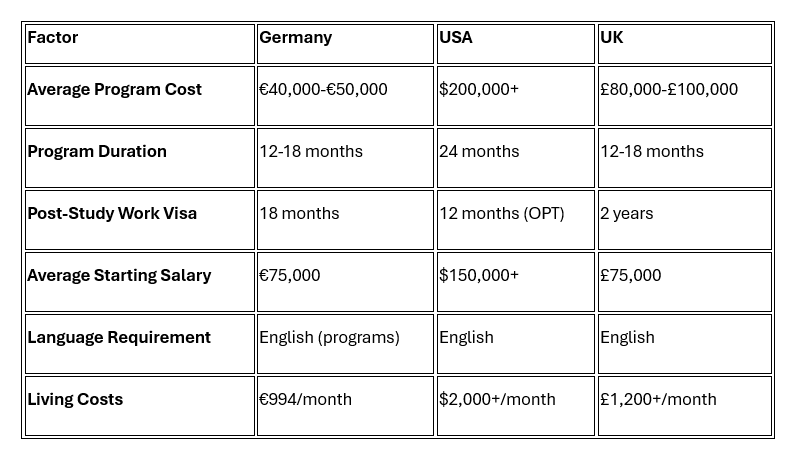Top MBA Colleges in Germany 2025: Rankings, Fees, Career Prospects & International Application Guide
Discover Germany's best MBA programs for 2025. Explore rankings, tuition fees, admission requirements, career prospects, and salary potential for international students plus expert tips for a successful application.


MBA in Germany: Your Gateway to European Business Success
Germany has emerged as one of the most attractive destinations for international MBA students seeking world-class business education at exceptional value. With top-ranked business schools consistently appearing in global rankings and graduates earning starting salaries between €60,000 to €102,000, pursuing an MBA in Germany offers an unbeatable combination of academic excellence, career opportunities, and affordability that rivals traditional MBA powerhouses like the US and UK.
Why Choose Germany for Your MBA?
Germany's MBA landscape offers compelling advantages that make it stand out as a premier destination for international business education. The country has quietly built a formidable reputation in management education, with institutions like Mannheim Business School, WHU, HHL Leipzig, ESMT Berlin, and Frankfurt School of Finance & Management regularly appearing in the global top 100 rankings.
Exceptional Value Proposition
The most striking advantage of pursuing an MBA in Germany is the exceptional return on investment. While top US MBA programs can cost over $200,000, German MBA programs typically range from €18,000 to €50,000 in total tuition fees. This significant cost difference, best ROI, combined with comparable post-graduation salaries, creates an attractive value proposition that's hard to match elsewhere.
Strong Job Market and Career Prospects
Germany's robust economy provides excellent career opportunities for MBA graduates. With global companies like BMW, Bosch, SAP, and Deutsche Bank actively recruiting MBA talent, the job market is particularly strong. Most of international MBA graduates find employment in Germany within six months of completing their degree, demonstrating the strong industry connections and career support provided by German business schools.
English-Taught Programs with Global Perspective
Most MBA programs in Germany are taught entirely in English, creating a truly international learning environment. Students learn alongside peers from 60+ countries, providing valuable cross-cultural experiences that are essential in today's global business landscape.
Comparing Germany to Other MBA Destinations
Germany vs. USA vs. UK


Top MBA Programs in Germany: Rankings and Overview
Germany hosts several world-class MBA programs that consistently rank among the best globally. Here are the leading institutions according to QS Global MBA Rankings 2024: Europe:
QS Global MBA Rankings 2024: Europe
Frankfurt School of Finance and Management, Global Rank #17, Rank in Germany #1
Mannheim Business School, Global Rank #18, Rank in Germany #2
WHU - Otto Beisheim School of Management, Global Rank #23, Rank in Germany #3
HHL Leipzig Graduate School of Management, Global Rank #43, Rank in Germany #4
EU Business School, Global Rank #47, Rank in Germany #5
Mannheim Business School
Mannheim Business School holds the esteemed Triple Crown accreditation (AACSB, AMBA, EQUIS) and stands as Germany’s #1 business school in Bloomberg Businessweek as well as other global rankings. Known for a collaborative learning environment and strong ROI, Mannheim ranks consistently top 10 in Europe in compensation and networking categories. Mannheim Business School achieved the highest rank in Germany for thought leadership and offers perfect scores for return on investment. The program features a unique Social Class Project where students collaboratively plan and implement group projects, directly applying management skills in real-world scenarios.
WHU – Otto Beisheim School of Management
WHU's MBA program stands out for its entrepreneurial focus and international exposure, featuring three international modules with study abroad opportunities at partner schools like Kellogg School of Management and Columbia University. The program boasts 90% of international students, creating a truly global classroom experience.
HHL Leipzig
HHL Leipzig Graduate School of Management offers a distinctive MBA experience characterized by academic excellence, international exposure, and a strong focus on leadership and entrepreneurship, making it stand out as one of the Top MBA colleges in Germany. The innovative and flexible full-time MBA program at HHL is designed to prepare responsible business leaders and entrepreneurs for the challenges of the 21st century, offering students the choice between the "Fast Track (15 Months)" for essential knowledge acquisition and quick return to work and the "Advanced Track (21 Months)" for additional electives, internships, or terms abroad.
Frankfurt School of Finance & Management
Frankfurt School ranks as the #1 MBA program in Germany and offers exceptional value with its 12-month full-time MBA program. Located in Germany's financial capital, the school provides strong connections to the finance and consulting industries, with graduates often securing positions at top-tier firms.
ESMT Berlin
ESMT Berlin combines strong academic foundations with practical application through real-world consulting projects with international companies. The school's location in Berlin provides access to Europe's fastest-growing startup ecosystem, making it ideal for entrepreneurially minded students.
Admission Requirements and Application Process
Pursuing an MBA in Germany offers a world-class education and excellent career opportunities for Indian students. To secure admission to Top MBA colleges in Germany, applicants must meet several eligibility requirements:
Bachelor's degree: Bachelor's degree in a relevant field from a recognized university.
GMAT/GRE Score: GMAT score of at least 600 or GRE equivalent, with a competitive score above 690 for better chances of admission.
English Language Proficiency: TOEFL score of at least 90/120 or IELTS score of 7 (with at least 6.5 in each section) to demonstrate English language proficiency.
Work experience: Min. 3 years of relevant professional work experience. (If less, than can pursue MiM Programs)
LORs: Letters of recommendation (usually 2).
Motivation letter: Statement of purpose (SOP) outlining your motivation and goals.
CV: Updated resume/CV highlighting your skills and achievements.
Application Timeline
Most German MBA programs follow rolling admissions throughout the year, though early applications are encouraged for Early Bird Scholarships. Typical deadlines include:
June 15 (visa required) or July 31 (no visa) for September entry
December 15 (visa required) or January 31 (no visa) for March entry
Career Prospects and Salary Expectations
Starting Salaries and Growth Potential - MBA graduates in Germany enjoy strong earning potential across various industries:
Experience Level: Salary Range (EUR) : Key Industries
Entry-level: €65,000-€85,000 :Consulting, Finance, Technology
Mid-level (3-5 years) : €85,000-€110,000 : All sectors
Senior-level (5+ years) : €120,000+ : Finance, Technology
Top Employers for MBA Graduates - Leading companies actively recruit MBA graduates from German business schools:
Consulting: McKinsey & Company, Boston Consulting Group, Bain & Company
Technology: SAP, Siemens, Amazon, IBM
Automotive: BMW, Audi, Mercedes-Benz, Bosc
Finance: Deutsche Bank, Commerzbank, Allianz
Cost of Living and Financial Considerations
Living Expenses - The cost of living in Germany is significantly lower than other major European destinations like London, Paris, or Amsterdam. International students should budget approximately €994 per month or €11,904 per year for basic living expenses.
Monthly Living Costs Breakdown:
Accommodation: €300-€800 (shared flats to city center apartments)
Transportation: €58 (unlimited public transport)
Health Insurance: €34-€150
Food & Dining: €150-€200
Leisure & Miscellaneous: €50-€150 (Varies on Individual Basis)
Return on Investment Analysis
German MBA programs offer exceptional ROI compared to US and UK counterparts:
Average total program cost: €40,000-€50,000 (including living expenses)
Average salary increase: 80-91% post-MBA
Payback period: Typically, 3-5 years
Long-term career growth: Strong progression opportunities in Europe's largest economy
Work Visa and Career Transition
Post-Study Work Opportunities
Germany offers excellent visa provisions for MBA graduates:
18-month job search visa after graduation
No restrictions on employment type - graduates can work in any qualified position
Clear pathway to permanent residency through skilled worker programs
Strong support from career services throughout the job search process
Value Proposition Analysis
Germany offers the best cost-to-benefit ratio among major MBA destinations:
Lower total investment than US/UK alternatives
Shorter programs minimize opportunity cost
Strong salary growth ensures quick ROI recovery
Strategic location provides access to entire European market
Work visa flexibility enables career establishment
Application Strategy and Next Steps
Preparing Your Application
Start Early: Begin preparation 12-18 months before intended start date to allow time for GMAT preparation, document gathering, and visa processing.
Focus on Fit: German schools value practical experience and clear career goals. Demonstrate how the MBA aligns with your professional trajectory.
Leverage Diversity: Highlight unique perspectives and experiences that contribute to classroom diversity.
Financial Planning
Research scholarships: Many schools offer merit-based aid for high-performing candidates
Consider living locations: Smaller cities offer lower costs while maintaining quality education
Plan for visa costs: Budget additional €500-€1,000 for visa processing and related expenses
Making the Decision
An MBA in Germany represents a strategic investment in your global career. With world-class education, exceptional ROI, and strong career prospects, German business schools offer compelling alternatives to traditional MBA destinations while providing access to Europe's largest economy and diverse business ecosystem.
The combination of affordable tuition, high-quality education, excellent job prospects, and comprehensive work visa support makes Germany an increasingly attractive choice for ambitious professionals seeking to accelerate their careers in an international context.
Whether your goal is breaking into consulting, advancing in technology, or launching your own venture, Germany's MBA programs provide the foundation, network, and opportunities to achieve your professional aspirations while building a successful career in the heart of Europe.
Why Choose ConsultAdmit for Your German University Journey
Expert Personalized Guidance: Unlike navigating the complex German application system alone, ConsultAdmit provides personalized support tailored to each student's unique circumstances and goals.
Proven Success Track Record: With testimonials highlighting the "easy and stress-free" application process, ConsultAdmit demonstrates consistent success in helping students achieve their German university dreams. The comprehensive approach addresses every aspect of the application journey, from initial university research through successful settlement in Germany.
End-to-End Support: Rather than piecing together information from multiple sources, students receive integrated support covering university search, application guidance, and visa assistance all from one trusted provider. This holistic approach ensures consistency and reduces the stress of managing multiple service providers throughout the complex application process.
Contact ConsultAdmit: Students ready to begin their German university journey can reach out via email at info@consultadmit.com or visit www.consultadmit.com to book their free consultation and explore service options.
Successfully applying to German universities requires methodical planning, thorough preparation, and persistent effort throughout the process. By following these essential steps and leveraging professional guidance from services like ConsultAdmit, international students can navigate the complexities of German higher education applications and secure admission to their desired programs. The investment in careful preparation and expert support pays dividends through successful admissions and smooth transitions to academic life in Germany.

